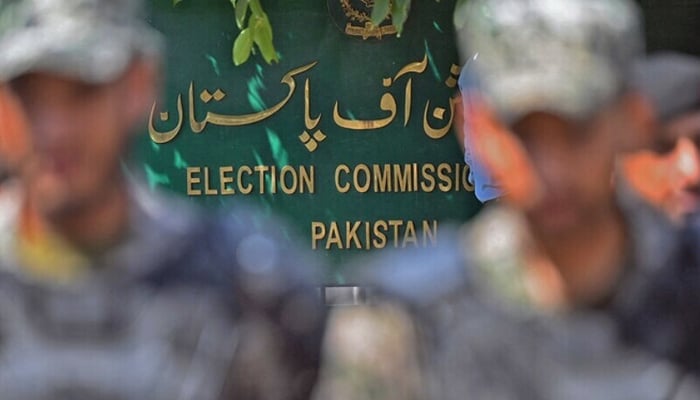ECP bench had reserved its verdict on November 30 in relation to the possibility of holding Imran’s trial in jail

Election Commission of Pakistan (ECP) sign board. — AFP/File
ISLAMABAD: In a first, the Election Commission of Pakistan (ECP) Wednesday announced to charge-sheet PTI founder and ex-premier Imran Khan and Fawad Chaudhry in contempt cases on Dec 13 at Rawalpindi’s Adiala Jail, where both are currently incarcerated.
The four-member bench of the ECP, headed by Sindh ECP member Nisar Ahmad Durrani, issued its verdict in the light of the Ministry of Interior’s denial to produce the former premier before the commission during the last few hearings, citing security concerns. The ECP held to charge sheet Imran as well as Fawad.
Both Imran and Fawad face contempt charges for using intemperate and contemptuous language against the Election Commission and Chief Election Commissioner Sikandar Sultan Raja and were issued notices in August last year. PTI Secretary General Asad Umar was also issued a notice for allegedly committing contempt of the electoral body.
The ECP bench had reserved its verdict on November 30 in relation to the possibility of holding Imran’s trial in jail. In its order, the ECP declared that it will conduct indictment proceedings against PTI supremo and ex-information minister Fawad Chaudhry in jail. The order also directed the Ministry of Interior to make necessary arrangements in this regard and notify the trial of the instant matter in jail.
The ECP’s bench asked the ministry to complete all necessary legal requirements for the proceedings within two days. In the last hearing of the cases, ECP member from Sindh Nasir Durrani had told Imran’s counsel Shoaib Shaheen that the Ministry of Interior had submitted a report that said that Imran could not be presented, proposing that the commission may send a team to jail to indict him.
To this, Imran’s lawyer had also expressed concern and pointed out that the jail trial of the leader of top political party would send a wrong message.
Asad Umar had made an appearance before the ECP bench in the last hearing and had submitted a response to the notice.












